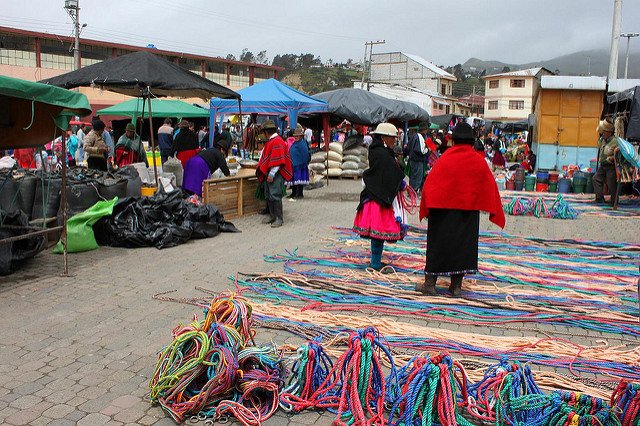This article was written by Skyler Narotsky, a 2016 Global Citizen Year Fellow in Ecuador. To read more about Skyler's experiences living in Ecuador and to learn more about how you too can take a Global Citizen Year in Ecuador, Senegal, Brazil, or India, visit globalcitizenyear.org.
Three kilometers above sea level in the southern Ecuadorian Andes sits the ancient indigenous kichwa-speaking community of Cañar. The terrain consists of steep ravines and grassy slopes. Most Cañaris work the fields as subsistence farmers producing crops native to the Andes such as quinoa and potatoes.
As is typical in many agricultural communities, life moves at a slow pace. People will take advantage of just about any opportunity to stop and chat with neighbors, friends, and family members about local gossip, the weather, and whatever else may come to mind. Just walking through the community along grassy trails between family farms, one stops to chat with those around. None take themselves too seriously and jokes told with a certain amount of sass and sarcasm are not just accepted, but encouraged and met with raucous laughter.
Read More: How One Man Is Transforming Education in the Ecuadorian Amazon
Community meetings are a favorite pastime — but they almost always start at least an hour after the advertised start time. The actual purpose of said meetings generally has little to do with the advertised meeting topic, which could be water quality, road repair, weekly planning, or agricultural workforce organization. The real, tacitly acknowledged reason for the meetings is to maintain strong community bonds.
Although daily life in Cañar is remarkably chill and peaceful, the indigenous community bears the weight of a tumultuous history. Once a powerful and independent nation recognized for innovations in metalworking and agriculture, Cañar had its freedom and glory stolen by two foreign conquests in the span of only 60 years, first by the Incas and later by the Spanish.

To be historically accurate, however, the Incas didn't exactly conquer the nation of Cañar. There was essentially a tense and semi-stable truce as the Cañaris were notoriously stubborn and refused to be conquered. This earned them the nickname in Quichua, "Piñashka Kañarikuna," or "The Angry Cañaris."
Then, after approximately 60 years of being more or less under the rule of the Incas, the game completely changed with the invasion by the Spanish in the early 1530s. The Cañaris at first welcomed the Spanish and, seeing them as liberators, helped them in the fight to defeat the Incas.
Read More: How Machismo Grows in Ecuador
After the Incan empire fell, however, the Spanish quickly betrayed the people of Cañar, enslaving them as they did to native populations all over Latin America. They remained as slaves, property of the Spanish conquerors, from that time until Ecuador declared it's independence from Spain almost 300 years later in 1822.
Unfortunately for the Cañaris, the struggle didn't stop there. They spent the next 150 years or so, up until around the 1960s, in de-facto slavery working on plantations either as indentured servants or sharecroppers. Although the Cañaris were the original inhabitants of the land, they were not allowed the same land ownership rights as the mestizos, or people of mixed Spanish and indigenous descent. This left them no other option but to work as semi-slaves on the land they once owned.
Only now that the indigenous people of Ecuador have officially been granted full citizenship rights are the Cañaris able to live freely on their native land.
Though the living circumstances have vastly improved in recent years, there is still a ways to go before equality can be achieved. The indigenous community still has a much higher poverty rate than the general population and due to centuries of oppression, some people still feel a sense of shame associated with their indigenous identity.
What is clear, however, is that the Cañaris are on the way back up. Most still continue to be proud of maintaining their ancient traditions and understand the importance of speaking their native Quichua. Their is a high value placed on education for young Cañaris as well as belief in and emphasis on the rights of all people, be they male or female, mestizo or indigenous, old or young, etc. Such values are taught in their schools and practiced in daily life.
The story of the Cañaris is the story of a proud and glorious people who lost it all but are on their way towards gaining it back. That is where I am living. That is my host community.